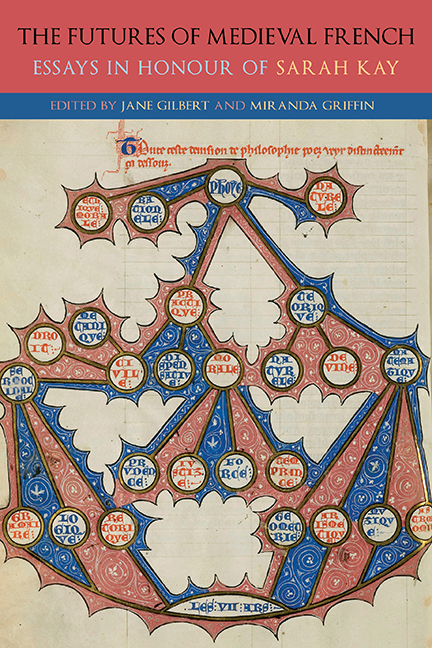Book contents
- Frontmatter
- Dedication
- Contents
- List of Illustrations
- List of Contributors
- List of Abbreviations
- Introduction
- Part I Subjectivity in Troubadour Poetry
- Part II The ‘Chansons de geste’ in the Age of Romance: Political Fictions
- Part III Courtly Contradictions: The Emergence of the Literary Object in the Twelfth Century
- Part IV The Place of Thought: The Complexity of One in French Didactic Literature
- Part V Parrots and Nightingales: Troubadour Quotations and the Development of European Poetry
- Part VI Animal Skins and the Reading Self in Medieval Latin and French Bestiaries
- Afterword
- General Bibliography
- List of Manuscripts
- Bibliography of Work by Sarah Kay
- Index
- Gallica
Troubadour Selves under Debate
Published online by Cambridge University Press: 27 May 2021
- Frontmatter
- Dedication
- Contents
- List of Illustrations
- List of Contributors
- List of Abbreviations
- Introduction
- Part I Subjectivity in Troubadour Poetry
- Part II The ‘Chansons de geste’ in the Age of Romance: Political Fictions
- Part III Courtly Contradictions: The Emergence of the Literary Object in the Twelfth Century
- Part IV The Place of Thought: The Complexity of One in French Didactic Literature
- Part V Parrots and Nightingales: Troubadour Quotations and the Development of European Poetry
- Part VI Animal Skins and the Reading Self in Medieval Latin and French Bestiaries
- Afterword
- General Bibliography
- List of Manuscripts
- Bibliography of Work by Sarah Kay
- Index
- Gallica
Summary
AMONG THE PRINCIPLES guiding the current editions of troubadour poetry, both the perceived centrality of the author and the complex relationship between the historical and the rhetorical selves stand out as prominent approaches. The existence and relevance of the historical self – the real biographical details of the author – remain an acknowledged starting point, bolstered by the trends of medieval readings of troubadours, notably chansonnier (song-manuscript) compilers’ preference for attributed poems and their tendency to order materials around the author as a central building block. Just as medieval biographers did in their vidas (the brief prose accounts of a troubadour's life that introduce his corpus in some chansonniers), we still consider it necessary to reconstruct the troubadour's biography, sometimes resorting to clues within the poetic compositions. However, nowadays information from vidas is (not unreasonably) filtered to reject everything that is not considered historical. The result is a more reliable historical portrait, but an important aspect is lost: the persona used by troubadours to voice and perform each composition, which through iteration and accumulation of details becomes their identifying, distinctive persona. This rhetorical self is not usually defined and reconstructed by modern critics. Medieval vidas, in contrast, though they might not have fully distinguished historical and rhetorical selves, leaned more heavily towards the latter, and with good reason, since their goal seems to be a biography of the rhetorical self.
While modern editions of the complete works of a particular troubadour show the effort that has gone into gathering biographical details, there is a clear bias towards characterising the whole corpus in ‘objective’ formal terms, such as metrical or stylistic. Moreover, partly because information is so scarce, biographical data is generally linked to the poetic corpus only at very specific points, mostly the interpretation of topical poems or the reconstruction of itineraries and chronological sequences. Accordingly, there is little place for a reconstruction of the rhetorical self, even though this self, built out of elements springing from the entire poetic corpus, might very well be essential to convey the meaning of single poems.
- Type
- Chapter
- Information
- The Futures of Medieval FrenchEssays in Honour of Sarah Kay, pp. 34 - 48Publisher: Boydell & BrewerPrint publication year: 2021

